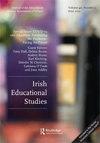Exploring the interpersonal, classroom relationships of mainstream teachers and special needs assistants in Irish primary schools
IF 1.2
4区 教育学
Q2 EDUCATION & EDUCATIONAL RESEARCH
引用次数: 0
Abstract
ABSTRACTAmidst changing sociocultural and political climates, limited economic resources and shifting educational policies, classroom teachers continue to hold a significant responsibility in educating an increasingly diverse student population. Balancing the requirement to support student variability within perceived everchanging contexts can be challenging for many teachers. To alleviate some of the pressures in educating diverse student populations, Special Needs Assistants (SNAs) have been deployed to support teachers in meeting the care needs of some children with special educational needs, arising from a diagnosed disability. Grounded in Bronfenbrenner’s Ecological System’s Theory (1974), the following study explored the interpersonal relationship of teachers and SNAs working in mainstream primary classrooms, in Ireland. Data from quantitative questionnaires and qualitative semi-structured interviews were collected with results from the questionnaires (N = 112) informing the questions for the semi-structured interviews (N = 8). Open-ended questions were used throughout the interview process to collect the nuanced experiences of classroom collaborations from both teachers and SNAs. Findings indicate that SNAs are a well-established and welcomed part of the school workforce. Difficulties with role confusion, a lack of structural guidance around SNA deployment and professional self-efficacy in SEN confirmed the existence of challenges, experienced by the two workforces, which lead to implications in practice for effectively collaborating in classrooms.KEYWORDS: Paraprofessional supportinclusionspecial needs assistantscontinuing professional development (CPD)policyspecial educational needs (SEN) AcknowledgementsThe author expresses gratitude to the teachers and SNAs who generously shared their time in this study, providing invaluable insights and serving as representatives of this sector within the Irish education system. It is a powerful reminder of the dedicated efforts being carried out in classrooms throughout the region to ensure the inclusion of every student.Disclosure statementNo potential conflict of interest was reported by the author(s).Notes1 Ireland employs a multitrack approach to schooling across both primary and secondary levels. Special Schools are designed to serve students with significant and complex educational and care needs. Special Classes within mainstream settings are designed to provide a more supportive and tailored learning environment for students with specific SEN, such as those with autism spectrum disorders or mild to moderate intellectual disabilities; Mainstream + Supports, is designed for general education classes and students with SEN may receive additional support from special education teachers, SNAs, and other professionals as needed; Mainstream is the standard educational track that serves the majority of students, including those without identified SEN.Additional informationNotes on contributorsHazel RyanSheehanHazel RyanSheehan has worked in inclusive and special education, initially as a special education teacher, and, thereafter, as a special needs assistant and special educational needs organizer. She is currently completing her PhD at the University of British Columbia, Vancouver, Canada, in Special Education. Her research interests focus on the area of inclusive and special education, paying particular attention to teacher and student conceptualisations of (dis)ability, teacher efficacy in relation to the inclusion of students with disabilities and student voice in inclusive-orientated practices.探讨爱尔兰小学主流教师和特殊需要助理的人际关系和课堂关系
摘要在不断变化的社会文化和政治气候、有限的经济资源和不断变化的教育政策中,课堂教师在教育日益多样化的学生群体方面继续承担着重要的责任。对于许多教师来说,在不断变化的环境中平衡支持学生可变性的需求是一项挑战。为减轻在教育不同学生群体方面的压力,学校调派了特殊需要助理,协助教师照顾部分因诊断为残疾而有特殊教育需要的儿童。以下研究以布朗芬布伦纳的生态系统理论(1974)为基础,探讨了爱尔兰主流小学课堂中教师与sna之间的人际关系。从定量问卷和定性半结构化访谈中收集数据,问卷结果(N = 112)为半结构化访谈(N = 8)的问题提供信息。在整个访谈过程中,我们使用开放式问题来收集教师和sna在课堂合作方面的细微体验。调查结果表明,sna是学校劳动力中一个完善和受欢迎的部分。角色混淆的困难,缺乏围绕SNA部署的结构性指导以及SEN中的专业自我效能,证实了两种工作人员所经历的挑战的存在,这导致了在课堂上有效合作的实践影响。关键词:辅助supportinclusionspecial需要assistantscontinuing专业发展(CPD) policyspecial教育需求(SEN) AcknowledgementsThe作者表达了感谢老师和系统网络体系结构(sna)慷慨地分享他们的时间在这项研究中,提供宝贵的见解,作为该行业的代表在爱尔兰的教育体系。它有力地提醒人们,整个地区的教室正在进行专门的努力,以确保包容每一个学生。披露声明作者未报告潜在的利益冲突。注1爱尔兰在小学和中学阶段都采用多轨教学方法。特殊学校是为有重大和复杂的教育和照顾需要的学生而设计的。在主流环境下的特殊课程旨在为有特殊特殊情况的学生,如自闭症谱系障碍或轻度至中度智力残疾的学生,提供更具支持性和量身定制的学习环境;“主流+支持”是为通识教育课程而设计的,有特殊教育障碍的学生可以根据需要从特殊教育教师、特殊教师和其他专业人员那里获得额外的支持;主流教育是为大多数学生服务的标准教育轨道,包括那些没有识别出特殊教育障碍的学生。额外信息贡献者说明hazel RyanSheehan hazel RyanSheehan一直从事包容性和特殊教育工作,最初是一名特殊教育教师,后来成为一名特殊教育助理和特殊教育需求组织者。她目前正在加拿大温哥华的英属哥伦比亚大学攻读特殊教育博士学位。她的研究兴趣集中在全纳和特殊教育领域,特别关注教师和学生对(残疾)能力的概念,教师在包容残疾学生方面的效能,以及学生在以包容为导向的实践中的声音。
本文章由计算机程序翻译,如有差异,请以英文原文为准。
求助全文
约1分钟内获得全文
求助全文

 求助内容:
求助内容: 应助结果提醒方式:
应助结果提醒方式:


